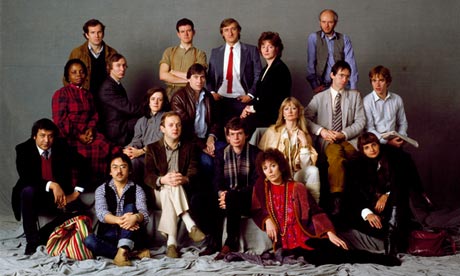Thirty years ago, Granta named our 20 most promising young writers – and established a tradition. The judges for the last three decades reflect on their decisions, while the magazine's current editor reveals the challenges of choosing this year's lineup

Write stuff … some of Granta’s 20 Best of Young British Novelists for 1983: back row (left to right) William Boyd, Adam Mars-Jones, Julian Barnes, Pat Barker and Clive Sinclair; middle row (left to right) Buchi Emecheta, AN Wilson, Christopher Priest, Ian McEwan and Martin Amis; front row (left to right) Shiva Naipaul, Kazuo Ishiguro, Ursula Bentley, Philip Norman, Graham Swift, Rose Tremain, Maggie Gee and Lisa St Aubin de Terán. Photograph: Snowdon/Camera Press
1983- Bill Buford Granta editor, 1979-95
In 1983, I was the editor of Granta and published a 320-page issue devoted to the so-called "Twenty under forty", otherwise known as Best of Young British Novelists. The issue was the first of its kind. Trust me, it said. I know what I am talking about. These young writers are the future of literature. Watch. History will prove me right.Thirty years on, that issue, reprinted many times, its roster largely vindicated, has earned me all kinds of kudos. Now, on its anniversary, I find myself in the reluctant position of needing to set the record straight. It wasn't me.
The idea was dreamed up by a marketing guy, Desmond Clarke, and in a place where good ideas are often created, during a steamy evening bath. Clarke was the head of an entity called the Book Marketing Council. This was the early 80s – Margaret Thatcher, Saatchi & Saatchi – when it was universally assumed that successful enterprises had marketing; failures did not. Dairies had long ago pitched in and created a Milk Marketing Board. Livestock farmers had made one for meat. If you can "Eat British Beef", why not "Buy British Books"? By 1983, Clarke had devised a few campaigns. Nothing would have the impact of his bathtub inspiration.
The selection of the 20 young novelists? That wasn't my doing either. That had been done by a panel, also of Clarke's devising, a wholesome foursome consisting of a popular literary biographer (Michael Holroyd), a popular literary novelist (Beryl Bainbridge), and two people from the book trade. The objective was fairness, not controversy. Clarke's obligations weren't to literary history, but to the publishers paying his rent. When the list of 20 under 40 was announced in the Sunday Times, on 22 August 1982, there was no noise or ceremony. Hoopla would have been premature because bountiful stacks of British books wouldn't be in the shops to buy yet. What mattered was the fortnight of frenzied promotion that was then planned for six months hence. The list itself was offered up as a given. At first, no one much noticed.
But I had noticed, even though previously I'd had no idea anything of the kind was going on. I was living in Cambridge, editing Granta. Of the 20 writers, I had new, unpublished manuscripts from 13. This is what literary magazines do, of course, listen out for a generation's new voice. Even so, 13 out of 20? I folded up my Sunday Times and put it in a briefcase. I looked at it the next day, on a train to London. I was meeting with Peter Mayer, the head of Penguin Books, in the hope that Penguin would distribute Granta to bookshops. He agreed. Maybe, I said, as our meeting concluded, we might start with an issue devoted to this. I reached into my briefcase for my Sunday Times. I was hesitant.
Maybe, he said. Both of us were a little nervous about taking instruction from a "marketing council". Who was this Desmond Clarke anyway?
I met him. He looked less like a Saatchi or one of the Mad Men than a miniature version of Benjamin Britten in a bad tie. Also, his shirt never stayed tucked in. It was only later that I realised that he was only pretending to be a marketing guy. I bet he writes poetry in his spare time.
In the event, he mounted a campaign, and books were sold: 250,000 copies. But the most evocative reminder of that peculiarly evanescent moment, a generation's coming into its own, might be the 320-page issue that Granta produced at some speed, largely because there had been so many manuscripts already on hand. That issue reads now like a school year book. Some class members have gone missing, although there is always the hope that one of them will return any day now, bearing a slim volume of brilliance. Some won't, including the abrasively promising Shiva Naipaul, cut down in 1985 and depriving us, in Martin Amis's phrasing, of "30 years of untranscribed, unvarnished genius". In every other respect, this class was exceptional. But so, too, was the time when they started publishing.
More
No comments:
Post a Comment